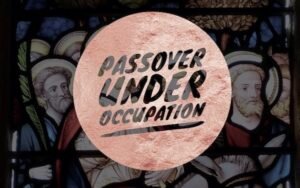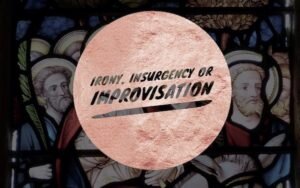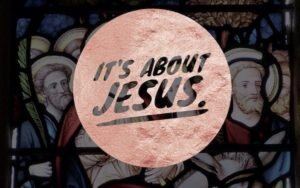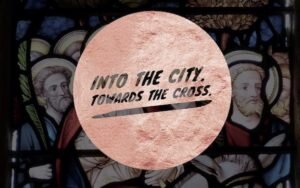Palm Sunday: The Politics & Power of the Kingdom
 Josh Richards preached a sermon on Palm Sunday exploring politics, power and the role of community organising in our church as a form of faithful improvisation.
Josh Richards preached a sermon on Palm Sunday exploring politics, power and the role of community organising in our church as a form of faithful improvisation.
Imagine what it would be like. To celebrate a festival of national liberation- of freedom- under Imperial occupation. What would that do to you? You, the first century Jew travelling to Jerusalem, your capital, the symbol of the Lord’s presence with you. You are going there to remember that mighty act of deliverance where God brought the Israelites out of Egypt. Where he showed his mastery over the gods of Egypt, the elements, even death.
 And yet, as you walk, you are aware more so than you normally are, of the presence of Roman soldiers. There are more of them as you approach the capital. In fact, the Governor Pilate, who is usually in Caesarea, has brought a garrison to Jerusalem for the festival.How do you relate to that story- of the Exodus, of Passover- when reality seems to laugh at it. How can you hear God when the drone of Empire is so total and so loud? We face a similar choice today. We see clearly how precarious our planet, our politics and life itself is. Even the parts of our society that are functioning as they should, operate on such a different logic to that of Easter. As we enter Holy Week, we recognise the ways in which the cluttered stories we live in jar with this fragile story of liberation that we remember this week.Indeed, as Jesus followers, we live in the constant tension of seeking to live out the truth of resurrection in a world so full of death. We find ourselves with the first century Jews asking how we navigate the tension between our faith’s promise of liberation with the realities of the world.
And yet, as you walk, you are aware more so than you normally are, of the presence of Roman soldiers. There are more of them as you approach the capital. In fact, the Governor Pilate, who is usually in Caesarea, has brought a garrison to Jerusalem for the festival.How do you relate to that story- of the Exodus, of Passover- when reality seems to laugh at it. How can you hear God when the drone of Empire is so total and so loud? We face a similar choice today. We see clearly how precarious our planet, our politics and life itself is. Even the parts of our society that are functioning as they should, operate on such a different logic to that of Easter. As we enter Holy Week, we recognise the ways in which the cluttered stories we live in jar with this fragile story of liberation that we remember this week.Indeed, as Jesus followers, we live in the constant tension of seeking to live out the truth of resurrection in a world so full of death. We find ourselves with the first century Jews asking how we navigate the tension between our faith’s promise of liberation with the realities of the world.
 One option is to distance oneself from the freedom story. It becomes simply too painful to sit in the tension between the world as it is and the world as it should be. In response, you adopt a posture of irony. Yes, you go to church because it’s a nice thing to do but you don’t really believe it will change anything.Like the high priests, we collude and compromise- and accept the world’s story as the true story and view the freedom story as simple escapism. We hear it in the Pharisee’s plea ‘Teacher, rebuke your disciples!’ – Hope is a dangerous thing, please, rain on their parade.And yet Jesus responds ‘if they keep quiet, the stones will cry out.’Jesus does not give us the option of using this story as escapism, as entertainment.Where do we notice that posture in our own lives? How might your life be different if you lived like this freedom story is true, if we dared to hope?If not irony, then what? Perhaps we might become insurgents? Perhaps we hear that promise of liberation and say: well it is for us to take. We might respond to the tension by seeking to resolve it with violence. Consider the character of Barrabas who we will encounter later this week. He and others like him were the reason why there were so many soldiers in Jerusalem at this time of year. We know from contemporary writers that Jerusalem was particularly susceptible to revolts around this time. Why? Because groups like the Zealots understood that the God’s lordship and promise of liberations had implications; that if this story was true then society and politics should look different. In this view, our job is to force the truth of our story upon the world.The problem with this approach is that it puts humanity at the centre of the story and therefore says that force and violence is the motor of history. Vengeance is no longer the Lord’s. Weakness is something to be defeated. Death is to be avoided. If we go in that direction, our story of liberation ends up as just another story of empire. Talk of revolution might feel good but it is so often seeking to do something that can only be achieved by Jesus Christ.This week, we join Christians around the world in reading Philippians 2. It is a hymn of the early church which when describing what Jesus did in his life- particularly in what he achieved on the cross- reaches for political language. As Stephen Backhouse highlights, considering ‘equality with God something to be used to your own advantage’ was the language used to describe when someone would run for Caesar: the process of amassing your power and campaigning. This Week of all weeks we remember that we follow the one who is equal with God and chose to use it for our advantage. It is striking that the only way that the early Christians could describe Christ’s victory is to say: it’s politics but not as we know it.Stanley Hauerwas puts it like this:
One option is to distance oneself from the freedom story. It becomes simply too painful to sit in the tension between the world as it is and the world as it should be. In response, you adopt a posture of irony. Yes, you go to church because it’s a nice thing to do but you don’t really believe it will change anything.Like the high priests, we collude and compromise- and accept the world’s story as the true story and view the freedom story as simple escapism. We hear it in the Pharisee’s plea ‘Teacher, rebuke your disciples!’ – Hope is a dangerous thing, please, rain on their parade.And yet Jesus responds ‘if they keep quiet, the stones will cry out.’Jesus does not give us the option of using this story as escapism, as entertainment.Where do we notice that posture in our own lives? How might your life be different if you lived like this freedom story is true, if we dared to hope?If not irony, then what? Perhaps we might become insurgents? Perhaps we hear that promise of liberation and say: well it is for us to take. We might respond to the tension by seeking to resolve it with violence. Consider the character of Barrabas who we will encounter later this week. He and others like him were the reason why there were so many soldiers in Jerusalem at this time of year. We know from contemporary writers that Jerusalem was particularly susceptible to revolts around this time. Why? Because groups like the Zealots understood that the God’s lordship and promise of liberations had implications; that if this story was true then society and politics should look different. In this view, our job is to force the truth of our story upon the world.The problem with this approach is that it puts humanity at the centre of the story and therefore says that force and violence is the motor of history. Vengeance is no longer the Lord’s. Weakness is something to be defeated. Death is to be avoided. If we go in that direction, our story of liberation ends up as just another story of empire. Talk of revolution might feel good but it is so often seeking to do something that can only be achieved by Jesus Christ.This week, we join Christians around the world in reading Philippians 2. It is a hymn of the early church which when describing what Jesus did in his life- particularly in what he achieved on the cross- reaches for political language. As Stephen Backhouse highlights, considering ‘equality with God something to be used to your own advantage’ was the language used to describe when someone would run for Caesar: the process of amassing your power and campaigning. This Week of all weeks we remember that we follow the one who is equal with God and chose to use it for our advantage. It is striking that the only way that the early Christians could describe Christ’s victory is to say: it’s politics but not as we know it.Stanley Hauerwas puts it like this:
‘Jesus's work is political, but the kingdom politics he represents is one that comes through the transformation of the world's understanding of how to achieve good results. Jesus refuses to use the violence of the world to achieve "peace." But that does not mean he is any less political or that he is not about the securing of peace.’
So, on Palm Sunday, what does this new politics look like? What are the themes that we should listen out for?
 It is about Jesus. He initiates. He leads. He acts. The job of his followers is:
It is about Jesus. He initiates. He leads. He acts. The job of his followers is:
- To stay close to him.
- To tell of all that they have seen him do.
- It is his story. Not ours.
- It is sensitive to context, what we might call incarnationalPilate has entered the city from Caesarea in the West with his garrison. Insurrectionists are already in the city. In response, Jesus arranges it so he enters the city from the East, purposely fulfilling the messianic prophecies from Zechariah. But doesn’t lead a revolt. He is clear what he is communicating. He acts to be understood- but subverts the expectations of everything
- It is a story of sacrifice.As we follow Christ, we note that to enter the city is to approach the cross. The Victory is not achieved by avoiding weakness but entering into the weakness, the self-emptying and even the death that the rest of the world seems to be organised around avoiding. This is a different kind of politics. It tells a different story about power.
 To be Christian is to be political but to inhabit a different kind of politics than the politics of the Pharisees or Barrabas. The question is how do we act? What does it mean to seek justice while not considering equality with God something to be used to your own advantage?This question has been and is central to my sense of Christian vocation. Growing up I was always deeply motivated by what it means as a Christian to seek to change the world but over the last couple of years I’ve come to recognise a shadow to what I’d previously seen as an almost entirely virtuous motive. I realise that this search was informed by a unhealthy desire for control, and often still is. I came to recognise a desire to seek to understand how world-changing works, as if once I figure out the world, it is safe to me. I was seekingAs I came to recognise that need in myself, God in God’s mercy helped me understand more deeply that there is no blueprint: No precise programme that as I roam around Westminster I can implement in exactly the same way as my wife would as a university chaplain or you do as a parent or a bus driver or a teaching assistant or a musician or a charity worker, or a doctor or a DJ. And this is a mercy. The danger for idolatry around world-changing knowledge is evidenced so clearly in the Cambridge Analytica revelations.Instead the call is what researchers at Vocation and the Common Good call ‘improvisations-of-love’. Our first task as those seeking to witness to Jesus in all we do is to get close to him, to intimately inhabit his story- to learn the chords, scales and rhythms of Jesus so that in whatever context we find ourselves in, we can draw on those resources and improvise to his glory. It is only through entering into the disciplines and liturgy of Christian living that we can recognise the quiet music of the Spirit- amidst a cacophony of empire, capitalism, despair and violence- and join in with that song.Therefore if we want to change the world, our first task is to inhabit the whole story of Christ: to follow him to the cross. Not just show up next Sunday to celebrate resurrection without having known the vulnerability and pain of the Passion, the terror of the Crucifixion or the dull despair of Easter Saturday.We have the whole story. Let’s embrace it. Knowing the end, we can confront the tension of the middle- and with the Spirit’s help, improvise.
To be Christian is to be political but to inhabit a different kind of politics than the politics of the Pharisees or Barrabas. The question is how do we act? What does it mean to seek justice while not considering equality with God something to be used to your own advantage?This question has been and is central to my sense of Christian vocation. Growing up I was always deeply motivated by what it means as a Christian to seek to change the world but over the last couple of years I’ve come to recognise a shadow to what I’d previously seen as an almost entirely virtuous motive. I realise that this search was informed by a unhealthy desire for control, and often still is. I came to recognise a desire to seek to understand how world-changing works, as if once I figure out the world, it is safe to me. I was seekingAs I came to recognise that need in myself, God in God’s mercy helped me understand more deeply that there is no blueprint: No precise programme that as I roam around Westminster I can implement in exactly the same way as my wife would as a university chaplain or you do as a parent or a bus driver or a teaching assistant or a musician or a charity worker, or a doctor or a DJ. And this is a mercy. The danger for idolatry around world-changing knowledge is evidenced so clearly in the Cambridge Analytica revelations.Instead the call is what researchers at Vocation and the Common Good call ‘improvisations-of-love’. Our first task as those seeking to witness to Jesus in all we do is to get close to him, to intimately inhabit his story- to learn the chords, scales and rhythms of Jesus so that in whatever context we find ourselves in, we can draw on those resources and improvise to his glory. It is only through entering into the disciplines and liturgy of Christian living that we can recognise the quiet music of the Spirit- amidst a cacophony of empire, capitalism, despair and violence- and join in with that song.Therefore if we want to change the world, our first task is to inhabit the whole story of Christ: to follow him to the cross. Not just show up next Sunday to celebrate resurrection without having known the vulnerability and pain of the Passion, the terror of the Crucifixion or the dull despair of Easter Saturday.We have the whole story. Let’s embrace it. Knowing the end, we can confront the tension of the middle- and with the Spirit’s help, improvise.
As a church, one of the best improvisations-in-love that we have been called to is the practice of Community Organising. As a member of Citizens UK we work with 20 other institutions in the borough and over 300 other institutions across the country. Broad-based community organising builds relationships across different communities to seek justice on issues of common concern.It allows us to live out those themes that we outlined.
- It lets our motivations be about Jesus.Its relational-base allows us to bring our whole selves- our motivations, our spirituality and our community- to the public square. Furthermore, in seeking justice with people of other faiths and none, we recognise their value to God and through encountering difference, understand ourselves and our Christian vocation better.
- It is contextual/incarnational.The focus on listening and one-to-one conversations allow us to respond to lived experience of those around us- and crucially, to what the Spirit is doing in our midst.
- It isn’t revolutionary.It recognises that the ministry of restoration is foremost the work of God the Son, accomplished on the cross- evidenced at the resurrection- and to be fulfilled at the Second Coming. Our job is not to build the kingdom of God but to wait for it. To witness in small, imperfect ways to that peaceable kingdom that Zoe spoke of last week.
This Holy Week, may we be drawn into the story of Christ so that we might recognise the ways in which He is working to redeem our homes, schools, universities and workplaces. May we go out- this Monday, Easter Monday and all Mondays after- confident in proclaiming the difference that this story of liberation makes to a world concerned with death-avoidance. And may we join together to organise for the flourishing of this place as we wait for God’s kingdom here in Hackney as in Heaven.
